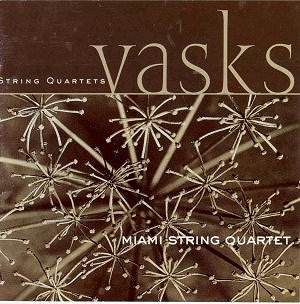AVAILABILITY
This disc can still be obtained intermittently
via Amazon.
This disc features
world premiere recordings of quartets
1 and 3. The Third is in four movements
and deploys Vasks’ stimulating and purely
presented soundworld. This takes an
icy feeling of plainchant and has much
in the way of stark lithe activity.
The pianissimo chitterings and slaloming
of the violins in the finale is his
closest approach to the avant-garde
but even then the 'glue' is a slow-stepping
plainchant melody. The ending personifies
the stillness of nocturnal Nordic skies.
That was 1995. Vasks'
world was very different in 1977 as
is announced by the fifteen minute First
Quartet which uses an aggressive aleatory
approach and Penderecki-like slides
and ululation. Whether or not this is
intended as music of protest and desperation
it certainly strikes me that way. Healing
comfort comes in the Melodia
finale in whose almost prayerful peace
and stuttered benediction we glimpse
the very best of Vasks. His music stands
understandably high in the international
stakes alongside that of Pärt (Cantus)
and Macmillan.
The Second Quartet
is in three titled movements. The work,
overall, bears the title Summer Tunes.
The glissandi of the first movement
Coming Into Bloom recall those
beloved of Hovhaness (Fra Angelico
overture) and return in the Elegy.
Birds preserves the glissandi
but has the blessing of bird chatter
as well. Elegy reminds me of
Geoffrey Burgon's chamber music in its
interjections and anxiety.
John Kehoe of the ill-fated
Conifer label provides a very personal
booklet note reminding us how Vasks'
voice and that of many Latvians had
been stifled during the long years of
Soviet rule.
A sometimes astringent
view into the world of Peteris Vasks.
His world-view seems almost religious
but his is the religion of open spaces,
solitude and nature - a pantheism only
occasionally disrupted by anxiety.
Rob Barnett
